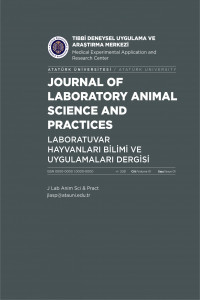Pürinerjik Reseptör Antagonisti A438079’un Sıçanlarda LPS’nin Neden Olduğu Böbrek Hasarı Üzerindeki Koruyucu Etkileri
Sepsis, organ disfonksiyonu ve yüksek mortalite ile ilişkili önemli bir klinik problemdir. Bu pürinerjik reseptörün sepsiste böbrek fonksiyon bozukluğu üzerindeki etkisini araştırmak için intraperitoneal LPS (Lipopolisakarit) enjeksiyonu ile sıçan modeli oluşturuldu. Çalışma Kontrol, A438079, LPS, LPS ve LPS+A438079 gruplarından oluşmaktaydı. Çalışma gruplarına LPS (8 mg/kg) enjeksiyonunu takiben A438079 (15 mg/kg) uygulandı (i.p). Daha sonra anestezi altında sakrifiye edilen ratlardan analizler için kan ve böbrek dokuları toplandı. Histopatolojik değerlendirmelerde A438079’un sepsisin neden olduğu hasarı azalttığı görüldü. LPS+A438079 grubuna ait serum örneklerinin kreatinin ve BUN (Blood Urea Nitrogen) konsantrasyonlarının LPS grubuna ait serum örneklerine göre daha düşük olduğu belirlendi. Böbrek dokularında AQP2, Bcl-2, Kaspaz-3 ve NfkB-p65 protein ekspresyonları western blot ile değerlendirildi. Öte yandan, A438079 ile tedavi edilen gruplarda bu proteinlerin ifadesinde azalma olduğu gözlendi. Sonuç olarak, A438079, LPS’nin neden olduğu akut böbrek hasarında enflamatuar yanıtı azaltabilir ve böbrek fonksiyon bozukluğunu iyileştirebileceği belirlenmiştir.
Anahtar Kelimeler:
A438079, LPS, purinergic receptor, rats, sepsis
Protective Effects of the Purinergic Receptor Antagonist A438079 on Lipopolysaccharide-Induced Kidney Injury in Rats
Sepsis is an important clinical problem associated with organ dysfunction and high mortality. To investigate the effects of this purinergic receptor on renal dysfunction in sepsis, a rat model was created by the intraperitoneal injection of lipopolysaccharides. The groups were control, A438079, lipopolysaccharides, and lipopolysaccharide+A438079. Following lipopolysaccharide (8 mg/kg) injection, A438079 (15 mg/kg) was administrated (intraperitoneally) in the study groups. Then, blood and kidney tissues were collected for analysis from rats sacrificed under anesthesia. In the histopathological evaluations, it was observed that A438079 reduced the damage caused by sepsis. It was observed that the creatinine and blood urea nitrogen) concentrations of the serum samples belonging to the lipopolysaccharide+A438079 group were lower than the serum samples belonging to the lipopolysaccharide group. Aquaporin-2, Bcl-2, caspase-3, and NfkB-p65 protein expressions in kidney tissues were evaluated by western blot. On the other hand, it was observed that there was a decrease in the expression of these proteins in the A438079-treated groups. In conclusion, A438079 can reduce the inflammatory response in acute kidney injury induced by lipopolysaccharides and improve renal dysfunction.
Keywords:
A438079, LPS, pürinerjik reseptör, sıçanlar, sepsis,
___
- 1
- 2
- 3
- 4
- 5
- 6
- 7
- 8
- 9
- 10
- 11
- 12
- 13
- 14
- 15
- 16
- 17
- 18
- 19
- 20
- 21
- 22
- 23
- 24
- 25
- 26
- 27
- 28
- 29
- 30
- 31
- 32
- 33
- 34
- 35
- 36
- 37
- 38
- 39
- 40
- 41
- Başlangıç: 2021
- Yayıncı: Atatürk Üniversitesi
Sayıdaki Diğer Makaleler
Laboratuvar Hayvanlarından Sıçan, Kobay ve Tavşan’ın Bazı Anatomik, Fizyolojik ve Üreme Özellikleri
Kübra GEÇMEZ, Hurrem Turan AKKOYUN, Meltem KIZIL, Mahire BAYRAMOĞLU AKKOYUN
Gürültü Kirliliğinin Ratlar Üzerindeki Biyolojik Etkileri
Nevra AYDEMİR CELEP, Seçkin ÖZKANLAR, Elif ERBAŞ, Adem KARA, Nergis ULAŞ
Naringin is a Possible Protective Agent in a Rat Model of Polymicrobial Sepsis
